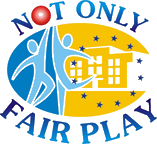
- Home
- Best
Practices - Toolkits
How to ... - Sport
Events - Guidelines
- Information
& Contacts - Project Management
A collection of student stories and initiatives about sport.
This section offers access to a collection of toolkits to promote sport at school.
-
 Physical Education Teachers
They are the main point of reference for students at school
Physical Education Teachers
They are the main point of reference for students at school
-
 Teachers
Teachers of all subjects can contribute to promote sport at school
Teachers
Teachers of all subjects can contribute to promote sport at school
-
 School Directors
Their support is a key element to promote sport at school
School Directors
Their support is a key element to promote sport at school
-
 Resources
A database of resources for teachers, PE teachers and school directors for the promotion of sport at school.
Resources
A database of resources for teachers, PE teachers and school directors for the promotion of sport at school.
Sporting events are organised in each partner country
Guidelines for policy makers willing to raise awareness on the importance of promoting sport in schools
Events
The Not Only Fair Play project has been promoted through conferences and articles.
Partnership
-
 Contractual Partners
From this section it is possible to access a description of each contractual partner of the Not Only Fair Play project.
Contractual Partners
From this section it is possible to access a description of each contractual partner of the Not Only Fair Play project.
-
 Schools
From this section it is possible to access information about the schools involved in the Not Only Fair Play Project in the 9 European countries involved.
Schools
From this section it is possible to access information about the schools involved in the Not Only Fair Play Project in the 9 European countries involved.
-
 Associated Partners
A number of associated partners officially joined the project in order to ensure the project sustainability by continuing to use the project deliverables over the next years.
Associated Partners
A number of associated partners officially joined the project in order to ensure the project sustainability by continuing to use the project deliverables over the next years.
This section of the Not Only Fair Play portal provides administrative information for the project contractual partners and for the European Commission, and is password protected.
Physical Education Teachers
Homepage > Toolkits > Physical Education Teachers

They are the main point of reference for students at school
Back to the Physical Education Teachers Toolkits
Promotion of an ethical approach to sport, including communication strategies with parents
A Toolkit for Physical Education Teacher
In the Online Resources available in this step teachers will find useful didactic materials – from background information about recommendations of the European Commission for teacher professional development to reflection on specific topics, like the ethical aspect of involving animals in sports activities, the ethics of sports reporting or using media to teach about values.
- Finding Character and Ethics in SportsThe materials focus on ethics and its relationship to sportsmanship. Activity sheets, discussion questions, lesson plans, vocabulary development and other resources provide many approaches to using The Washington Post articles that cover ethics practices in sports.
- Tips for Teaching about Keeping a Positive AttitudeIt’s a webpage of The Wise Skills Program, which is an interdisciplinary teacher-friendly approach to character education and social emotional learning. The materials for teachers include tips and ideas for teachers concerned about educating for character.
- Code of Ethics for EducatorsThe webpage presents ethical rules for educators structured in 4 basic principles: Ethical Conduct toward Students, Ethical Conduct toward Practices and Performance, Ethical Conduct toward Professional Colleagues, Ethical Conduct toward Parents and Ethical Conduct toward Community.
- The Ethical Leadership ScalesThe webpage provides possibility for comprehensive reflection about qualities that constitute ethical behaviour and ethical leadership. By using a measuring scale users are able to determine their levels of ethical competence.
- Supporting teacher competence development for better learning outcomesA document produced by experts of European Commission providing an overview of school policy in terms of teacher professional development.


